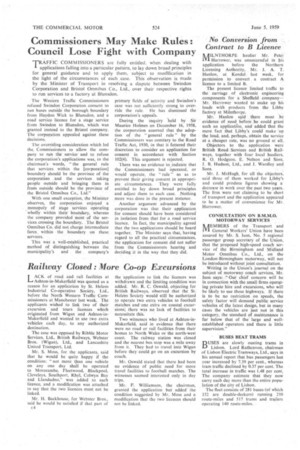Commissioners May Make 'Rules : • Council Lose Fight with Company TRAFFIC .COMMISSIONERS are fully entitled, when dealing with
Page 46

If you've noticed an error in this article please click here to report it so we can fix it.
applications falling into a particular pattern, to lay down broad principles for general guidance and to apply them, subject to modification in the light of the circumstances of each case. This observation is made by the Minister of Transport in resolving a dispute between Swindon Corporation and Bristol Omnibus Co., Ltd„ over their respective rights to run services to a factory at Blunsdon.
The Western Traffic Commissioners refused Swindon Corporation ,consent to run buses outside the borough boundary from Haydon Wick to Blunsdon, and a road service. licence for a stage service from Swindon to Blunsdon, which was granted instead to the Bristol company. The corporation appealed against these decisions.
The overriding co-nsideration.which led the, Commissioners to allow the company to run the service' and to refuse the corporation's applications was, in the chairman's words, " the general rule that services within the [corporation] boundary should be the province of the corporation . and the services taking people outside and bringing them in from outside should be the province of the Bristol. Omnibus Co., Ltd." With one small exception, the Minister observes, the corporation enjoyed a monopoly of Stage services operating wholly, within their boundary, whereas the company provided most of the services. crossing the boundary. The Bristol Omnibus Co. did not charge intermediate fares, within the boundary on these services.
This was a well-established, practical method of distinguishing between .the municipality's and the company's primary fields of activity and Swindon's case was not sufficiently strong to override the rule. He has dismissed the corporation's appeals. During the inquiry 'held by Sir Maurice Holmes on December 16, 1958, the corporation asserted that the adoption of the "general rule" by the Commissioners was contrary to the Road Traffic Act, 1930, in that it fettered their discretion to consider an application for consent in accordance with Section 102(4). This argument is rejected. There was no evidence to indicate that the Commissioners had Operated, or would operate, the " rule " so as to prevent their giving consent in appropriate circumstances. They were fully entitled to lay down broad principles and adjust them to each case. Nothing more was done in the present instance Another argument advanced by the corporation was that their application for consent should have been considered in isolation from that for .a road service licence. In fact, the municipality agreed that the two applications should be heard together. TheMinister says that, having regard to all the practical circumstances, the application for consent did not suffer from the Commissioners hearing and deciding it in the way that they did.




































































































































